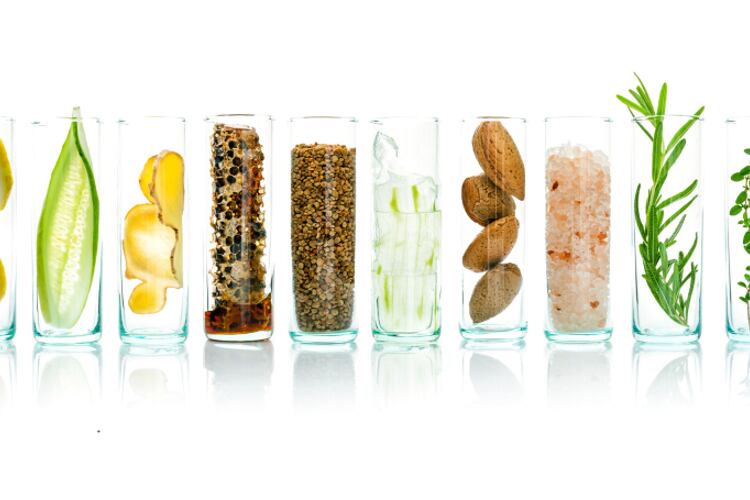The enlarged entity, called DSM-Firmenich, is ‘truly a merger of equals’ that will bring together two companies that place science at the heart of their businesses, are purpose-led and share ‘common values’, DSM Co-CEO Dimitri de Vreeze said during a conference call to discuss the plan this morning.
“This merger is about bringing two iconic companies together and creating an industry leader,” fellow DSM Co-CEO Geraldine Matchett noted.
Matchett and de Vreeze will continue as Co-CEOs of the combined business, with CFO and COO responsibilities respectively.
An €11.4bn taste and nutrition powerhouse
DSM-Firmenich will combine the respective strengths of both companies across the flavours, fragrances and nutritional ingredients segments.
In 2021, the two companies generated adjusted proforma EBITDA of €2.2bn on proforma sales of €11.4bn. The companies said the 20%+ adjusted EBITDA margin is expected to move to a 22-23% range over the medium term, supported by synergies.
When the merger is finalised, DSM-Firmenich will be arranged in four strategic business units: animal nutrition and health will account for 29% of sales; perfumery and beauty will generate 28% of revenue; health, nutrition and care will contribute 18% to the top line; while food & beverage / taste & beyond, will account for 24% of group sales.
The €2.7bn food and beverage unit will undergo the ‘biggest transformation’ as DSM's and Firmenich's capabilities are integrated, de Vreeze predicted. According to the company, it anticipates an annual sales uplift of circa €500m from combining DSM's food & beverage and Firmenich's taste & beyond businesses.
Food & beverage / taste & beyond will form a ‘global-scale partner to the food and beverage industry’ with ‘extensive capabilities’ in taste and nutrition focusing on ‘delicious, nutritious and sustainable’ products. “The new business will lead the diet transformation in creating healthier, great-tasting, accessible food and beverages with more natural and sustainable ingredients, including market and innovation leadership in naturals and clean label products; in plant-based foods; and in supporting a superior taste experience whilst enhancing food's nutritional profile,” the companies said.

Sales synergies step-up growth
The companies have a combined historical organic growth rate of 5%. However, management predicted this will increase as they leverage sales synergies to boost the growth outlook.
Mid-single digit underlying sales will be ‘gradually’ accelerated to a 5-7% range, supported by revenue synergies and R&D.
Placing the deal’s synergy value at circa €340m, Matchett revealed 50-60% of this will come from ‘growth’ as the company leverages sales synergies and the enhanced opportunities unlocked by ‘bringing our capacity together’. The combination is expected to realize recurring run-rate pre-tax synergies of approximately €350m adjusted EBITDA per year by 2026.
On cost savings, the Co-CEO said that the larger company will see some ‘economies of scale’ pointing to opportunities in the supply chain and procurement to cut costs. However, she continued, management ‘doesn’t see [cost synergies] being driven by big redundancies’.
R&D capacity and a ‘strong’ innovation pipeline
Insisting that this is a growth story, research and development will be a critical to the enlarged group’s future trajectory.
de Vreeze said DSM benefits from a ‘strong innovation pipeline driving sales four healthy people and planet’.
Meanwhile, Firmenich CEO Gilbert Ghostine said that the Swiss-based group’s focus on research and development leaves it ‘well-placed to capitalise on structural growth trends’ across areas like taste and fragrance.
According to figures released by Firmenich, in 2021 9.3% of its revenue was spent on R&D, compared to 8.4% at Givaudan, 6.1% at IFF and 5.9% at Symrise. In that year, Firmenich’s annual turnover was reported as CHF4.3bn, meaning that its annual investment in research stood at around CHF399m (€388.4m).

DSM-Firmenich had a combined R&D spend of €700m+ in 2021, it was revealed today. Following the merger, a spokesperson for the companies confirmed the R&D budget would remain at around €700m, representing approximately 6.14% of total group sales.
“DSM-Firmenich plans to dedicate EUR700m to R&D across 15 global R&D facilities; 88 manufacturing sites; 40 creation centres; 78 application labs and 70 premix sites. The new company will benefit from complementary capabilities across fragrance, taste, texture and nutrition, fuelled by world-class science,” the spokesperson told us.
“The combined company will be able to leverage these capabilities, expand its ‘science toolbox’, and apply it across a much wider area of applications. This will build on both companies’ track record of delivering ground-breaking innovations.
“The opportunities arising from the strong and complementary science platforms are one of the key reasons for this merger. Both DSM and Firmenich are fully committed to continue to invest in R&D/S&I at the same level. How exactly this will pan out is something that will be part of the integration journey, which will involve the respective teams.”
Looking to the future of DSM-Firmenich’s innovation teams, de Vreeze said they will be ‘powered by digitally enabled business models with science at its core’.
Consolidation and food security
Firmenich’s Ghostine conceded that the merger proposal comes within the context of a consolidating flavours sector. However, the executive stressed, Firmenich has been an active player in the process of consolidation.
“Our industry is consolidating. There have been 65 acquisitions over the last four years. Firmenich has been active in the consolidation of the industry,” he said pointing to the 14 deals the company has been involved in over that time period.

Combining the might of DSM and Firmenich provides a number of competitive advantages for the enlarged group – and also for its customers, de Vreeze added.
Not least among these is the promise of supply security during a period marked by global uncertainty. “We are going to use the strength of our infrastructure to create a credible and reliable supply… in these insecure times,” he reflected.
DSM-Firmenich's aligned approach to purpose also positions it to meet the evolving needs of its customer base, the group continued. "With a unique legacy as responsible businesses, DSM-Firmenich will build on a pioneering track record of environmental and social action over many decades. DSM-Firmenich will uphold each company's world-class ESG performance of acting on climate change, embracing nature and caring about people throughout its value chain," it claimed.
At inception, DSM shareholders will own in aggregate 65.5% of DSM-Firmenich and the various shareholders of Firmenich will own in aggregate 34.5% of DSM-Firmenich and receive €3.5bn in cash.
Once the merger is completed, DSM-Firmenich will be listed on Euronext Amsterdam.

